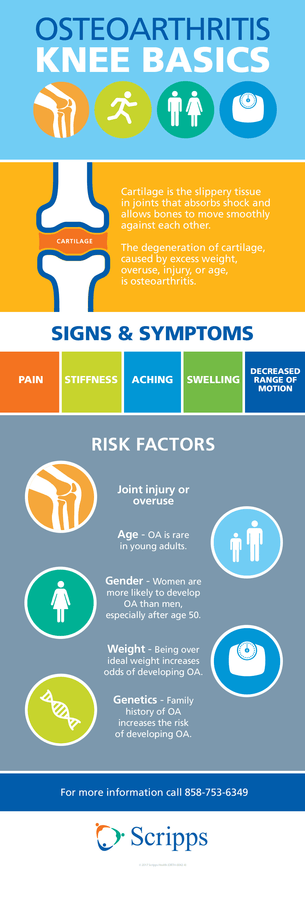Osteoarthritis Knee Basics
How do you know if you have knee osteoarthritis (OA)?
How do you know if you have knee osteoarthritis (OA)?
When looking for the cause of knee pain, orthopedic doctors usually conduct a physical exam and review imaging tests (often X-rays) to diagnose what’s happening in the joint. They’ll also want to hear what your symptoms are like during and after certain activities. But because no patients have the same body or have lived the same lives, OA can present itself in different ways over time.
One thing is for certain: It’s not an overnight phenomenon.
OA happens over years. And as we grow older, many people chalk up knee or hip changes to aging. But at some point, what once felt like subtle changes can begin to hold you back in your daily life. If you have one of the five top symptoms of knee OA — pain, stiffness, aching, swelling and decreased range of motion — it might be time to see a doctor.
Are you at risk of OA?

Are you at risk of OA?
Certain risk factors can increase your chances of OA in the knee. These five risk factors should be viewed as a general guide and are not a substitute for medical exams, imaging tests and consultations by physicians.
Knee injury
A joint injury or overuse can impact the structure and biomechanics of a knee or hip.
Age
Older patients (65 or older) are more likely to be diagnosed with OA than younger patients. OA that develops before 65 may go unnoticed by a patient until the damage becomes worse and causes severe pain and other symptoms that disrupt daily life.
Gender
Women are more likely to develop OA than men. Researchers have been studying possible links between the biomechanics of women’s knees and OA, as well as the possible effects of hormonal changes after menopause on bone health.
Weight
Carrying extra body weight places more strain and wear on your knees and hips, which can lead to OA. Over time, for example, 10 extra pounds can deliver up to 50 pounds of force on each knee with each step over a mile-long walk.
Genetics
The genes you inherited from your parents may raise your chances of developing OA, but genetics isn’t considered a direct cause of OA.
When to see your doctor about knee pain
When conservative treatments haven’t provided long-term pain relief, patients may face a decision about knee or hip replacement. In all but the most extreme cases of OA, the answer about whether to proceed with surgery usually rests with you — the patient.
That’s because each person is unique — with different pain thresholds, activity levels and lifestyle goals, such as losing excess weight. The journey to managing knee or hip OA is a uniquely personal one that you should make with a specially trained orthopedic doctor.